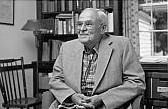-
(b.) -1905 November 28(d.)1995
Bio/Description
A Canadian-born American mathematician who made important contributions in topology, game theory, and non-linear programming. Born in Oshawa, Ontario, Canada, he earned his B.A. at the University of Toronto in 1928. In 1932, he completed his Ph.D. at the Princeton University under the supervision of Solomon Lefschetz, with the thesis An Abstract Approach to Manifolds. In 1932?33 he was a National Research Fellow at Cambridge, Harvard, and the University of Chicago. He then returned to Princeton to join the faculty in 1933, where he stayed till 1970. He chaired the mathematics department for about twenty years, one of the longest tenures. His extensive relationships within the field made him a great source for oral histories of the mathematics community. Years later, Dartmouth College recognized him with an honorary degree. In 1950, he gave the name and interpretation "prisoner's dilemma" to Merrill M. Flood and Melvin Dresher's model of cooperation and conflict, resulting in the most well-known game theoretic paradox. He is also well known for the Karush?Kuhn?Tucker conditions, a basic result in non-linear programming, which was published in conference proceedings, rather than in a journal. In the 1960s, he was heavily involved in mathematics education, as chair of the AP Calculus committee for the College Board (1960?1963), through work with the Committee on the Undergraduate Program in Mathematics (CUPM) of the MAA (he was president of the MAA in 1961?1962), and through many NSF summer workshops for high school and college teachers. In the early 1980s, he recruited Princeton history professor Charles Gillispie to help him set up an oral history project to preserve stories about the Princeton mathematical community in the 1930s. With funding from the Sloan Foundation, this project later expanded its scope. Among those who shared their memories of such figures as Einstein, von Neumann, and G?del were computer pioneer Herman Goldstine and Nobel laureates John Bardeen and Eugene Wigner. He noticed the leadership ability and talent of a young mathematics graduate student named John G. Kemeny, whose hiring he suggested to Dartmouth College. Following Tucker's advice, Dartmouth recruited Kemeny, who became Chair of the Mathematics Department and later College President.
-
Date of Birth:
1905 November 28 -
Date of Death:
1995 -
Gender:
Male -
Noted For:
Developer of the Karush–Kuhn–Tucker conditions, a basic result in non-linear programming -
Category of Achievement:
-
More Info:


